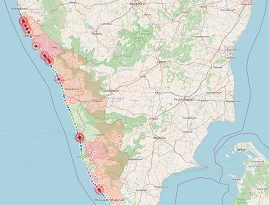African farmers earned about US$282 million from GMOs in 2020 – New Study
07 November 2022, Africa: African farmers earned an estimated US$282 million from growing genetically modified crops in 2020, a new study has revealed.
The study published by PG Economics in the UK revealed that globally farmers across the globe earned an estimated $18.8 billion in additional benefits from growing GM crops.
1.5% of that income (US$282 million) went to farmers in Africa, while farmers growing GM crops in the USA, Argentina, India, China, and Brazil accounted for 39.1%, 15.1%, 8.1%, 8.4%, and 18.3%, respectively.
According to the study by Dr. Graham Brookes, 55% of the farm income benefits in 2020 were earned by developing country farmers, with the remaining 45% going to farmers in developed countries.
Cumulatively, between 1996 and 2020, the net global farm income benefit from growing GM crops was $261.3 billion. Only 1.2% of the total amount went to farmers in African countries, with the USA farmers getting 42.5%, Brazil – 12.7%, India – 10.5%, and China – 10.1%, among others.
Genetically modified crops are currently grown commercially in less than 10% of Africa’s 54 countries. Ghanaian farmer Evans Okomeng of the Graduate Farmers Association says it is worrying that African farmers are not benefitting enough from the huge earnings that GMOs are giving their counterparts in other parts of the world. “There shouldn’t be any difference between African farmers and farmers in other parts of the world. The access to seeds, technologies, and equipment that American farmers get, I don’t think it will be a bad idea for the African farmer to also have that access,” he told Alliance for Science in an interview.
“Our leaders should allow us to grow the kind of seeds we want to grow as farmers. Like the GMO varieties. That is how we can increase our economic might and help make the continent food secure,” Okomeng, who is also the Chief Executive Officer of Millennium Farms, said.
The study, also published in the GM Crops and Food Journal, included an analysis of existing farm-level impact data on GM crops, contained in previously published peer-reviewed studies and other research papers. Economic benefits to farmers were broadly assessed by looking at gross farmer income and variable costs of production. The author says he also conducted specific impact analysis of some GM trait-crop combinations in some of the countries where there was limited published research.
Cumulatively, since 1996, genetically modified insect resistance technology has added $67.8 billion to the income of global maize farmers. There have also been substantial gains in the cotton sector through a combination of higher yields and lower costs. From 1996 to 2020, cotton farm income levels in countries growing GM crops amounted to $73.11 billion. The GM herbicide tolerant technology in soybeans boosted farm incomes by an additional $74.65 billion over the same duration.
Dr. Brookes says crop biotechnology continues to make a significant contribution to global agricultural production, as GM crops have increased food, feed, and fibre production by nearly 1 billion tonnes between 1996 and 2020. Over the duration, the GM technology has been responsible for the additional global production of 330 million tonnes of soybeans, 595 million tonnes of maize, 37 million tonnes of cotton lint, 15.8 million tonnes of canola and 1.9 million tonnes of sugar beet.
The paper says GM crop technology continues to make an important contribution to reducing the environmental footprint of agriculture and securing global food supplies in a sustainable way.
For instance, GMOs reduced carbon emissions by 39.1 billion kilograms, arising from reduced fuel use of 14.7 billion litres. The figure is equivalent to removing 25.9 million cars from the roads.
The study says GM technology also helped farmers to reduce the environmental footprint associated with their crop protection practices by over 17%. From 1996 to 2020, crop biotechnology reduced the application of crop protection products by 748.6 million kilograms. This represents 7.2 percent less usage of chemicals in countries where insect resistant GM crops are grown.
Crop biotechnology has also significantly reduced agriculture’s greenhouse gas emissions by helping farmers adopt more sustainable practices such as reduced tillage, which decreases the burning of fossil fuels and retains more carbon in the soil.
According to the paper, had GM crops not been grown in 2020, an additional 23.6 billion kilograms of carbon dioxide would have been emitted into the atmosphere. This is equivalent to putting an additional 15.6 million cars on the roads.
The study additionally reveals GM crop technology has increased yields through improved control of pests and weeds. For example, between 1996 and 2020, insect resistant GM technology used in maize increased yields by an average of 17.7 percent, relative to conventional production systems. The technology also caused an average of 14.5 percent increase in cotton yields over the duration.
The application of crop biotechnology also reduced pressure to bring new land into agriculture. For example, if crop biotechnology had not been available to farmers in 2020, maintaining global production levels that year would have required the planting of an additional 11.6 million hectares (ha) of soybeans, 8.5 million ha of maize, 2.8 million ha of cotton and 0.5 million ha of canola.
In a statement copied to the Alliance for Science, Dr. Brookes observed that crop biotechnology delivers an excellent return on investment for the farmers using the technology. Over the 1996-2020 period, farmers in developing countries received $5.22 as extra income for each extra dollar invested in GM crop seeds, whereas their counterparts in developed countries received only three dollars.
Also Read: Agriculture and the agricultural economy is the strength of India: Union Agriculture Minister
(For Latest Agriculture News & Updates, follow Krishak Jagat on Google News)















